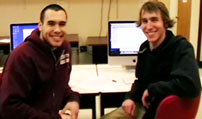CAITE Highlight
UMass Amherst students team with professor to improve e-book
A new electronic textbook for elementary Java programming, called
iJava, is being used by teachers and students in six Boston-area high
schools. With the support of CAITE, the resource is being enhanced by
two students at the University of Massachusetts Amherst funded through
the National Science Foundation's Research Experience for
Undergraduates (REU) program. The iJava textbook, developed by UMass
Amherst Professor Robert Moll, is the ultimate in interactive training
in programming: repeatedly throughout the book, students read a few
paragraphs of explanation and then type computer code at their
textbook, which responds to the submission in real time with right-or-
wrong judgments.
Sean Dooley (right) and Mario Barrenechea (left), both sophomores at 
UMass, are now takingREU students the book a step further by creating a more dynamic and creative way of experiencing the text by developing a java applet for each chapter of the book. Students are able to use
the applet to actually run the program in the book in order to see what it does. This "canned execution" goes through the code to explain what is produced in greater detail--clarifying the coding process.
With parents working in information technology, Mario and Sean have
both been interested in computers most of their lives. When they
discovered computer science in high school, it was a natural
progression for them to continue their studies in college. Their
experiences in the UMass computer science department so far have been
top notch. "It's been so nice to have professors who really care about
our learning. That's really what we need to get people to want to
learn," Sean said. Professor Moll has been instrumental in engaging
Mario and Sean in this research. Mario commented that while "we talk
about the conceptual, artistic and creative aspects of the work, we
then add the technical logistics around the time and work involved,"
all of which is based on "learning how to entice the students" who
will be using iJava.
iJava already has a track record at UMass Amherst. In fall 2004, only
63% of students in the introductory Java class passed the course final
exam. After the introduction of iJava, pass rates rose to 85%. The new
student-designed improvements may result in even higher pass rates and
persistence in the future. For more information about iJava click here.